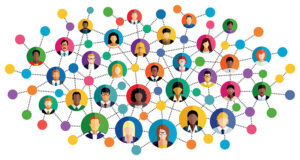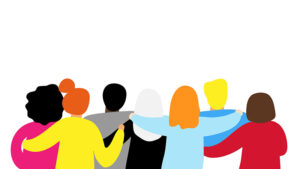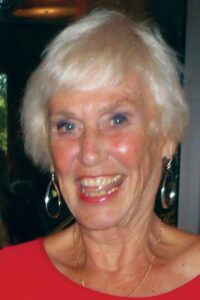By Barbara Pierce
 What would you say is the single most valuable thing you can do to stay healthy and happy as you age?
What would you say is the single most valuable thing you can do to stay healthy and happy as you age?
You might say exercising or being active every day, or maybe eating less unhealthy food and more healthy food, or keeping up with your primary care appointments. Visiting a primary care center for your checkups is essential to staying healthy.
You wouldn’t be wrong — all of those things are valuable.
However, the most valuable is not on that list. The most valuable thing you can do to stay healthy and happy as you age is connecting with others.
This surprising finding is from the Harvard study, done by Harvard Medical School, which has followed a group of Harvard students and other men for the past 85 years. The study found that meaningful social connections play a huge role in our physical and emotional well-being.
How happy we are in our relationships has a powerful influence on our health, concluded the study director online.
“That’s the startling revelation!” he said.
Our bodies work better when we’re not alone. The need for other people is hardwired into our brains.
Several months ago, I mentioned in this column that I just moved into a retirement complex. I didn’t know anyone living there or anyone in the city I was moving to. I know the importance of connecting with others. As I’m an introvert, I knew I’d need to step outside of my comfort zone to make connections.
In that column, I said I was considering this an experiment — my own research project — and I’d let you know how it worked out.
My experiment was a success; I have made friends with most everybody, of course, some closer than others.
There’s my neighbor, Evelyn, a feisty 91-year-old fighting dementia with all she has. We walk to and from meals together, sit together at meals.
 Then there’s Lila, my age, like me still active mentally and physically. We often sit together and compare notes on the paths our lives have taken. And Trish, who comes to the exercise classes I lead. She is a 73-year-old struggling with Parkinson’s; it’s hard to think about what the disease will do to her. And Rick. The friendly good-natured 78-year-old has had several bad strikes against him. In the hurricane that recently devastated Florida, he lost his home, car and boat. Before that, the once-research scientist crashed his motorcycle, damaging his brain. He asks me for advice as he recognizes that his judgment is impaired.
Then there’s Lila, my age, like me still active mentally and physically. We often sit together and compare notes on the paths our lives have taken. And Trish, who comes to the exercise classes I lead. She is a 73-year-old struggling with Parkinson’s; it’s hard to think about what the disease will do to her. And Rick. The friendly good-natured 78-year-old has had several bad strikes against him. In the hurricane that recently devastated Florida, he lost his home, car and boat. Before that, the once-research scientist crashed his motorcycle, damaging his brain. He asks me for advice as he recognizes that his judgment is impaired.
I think what helped me make friends is that I’m able to smile easily and make eye contact. As I worked with people all my life, developing the ability to remember their names and stories. People love that I remember.
As I’m reserved in sharing information about myself, I do better asking questions and listening.
“The most basic and powerful way to connect to another person is to listen. Just listen. Perhaps the most important thing we give each other is our attention,” said author Rachel Naomi Remen in one of her books; she worked with people with terminal illnesses.
I do need to be careful about my question-asking so it doesn’t feel like an interrogation. I need to remind myself to be more open and sharing about myself.
And I’ve done things purposely to help me connect to others. Like volunteering to work in the residents-run little store. I’ve become friends with Kay who comes in often to buy an ice cream sandwich, Tom who buys milk duds daily, Rose Marie, cat food. I’m happy to see each one.
I lead an exercise group, moving to music on YouTube; I’m the bingo caller; I help in the library. And notice when newcomers move in, helping make them feel OK.
I’ve had the advantage of people living in the same apartment complex to become friends. It’s harder when you have to get in your car and go out to be with people. But I encourage you to do that: find something you would enjoy and go. Volunteer, join a regular social group at a church, community center, and library; investigate a new hobby, or revive an old one.
Remember that friendships don’t grow without effort. When you meet someone intriguing, be bold and suggest a next step, like coffee or lunch. A simple overture can go a long way; you never know where it could lead. Many of us hit a wall here; I certainly do. But if you don’t take action, you won’t form any new relationships.
Once you’ve made a new friend, stay in touch. Regular contact deepens your connection with others.
I’m especially excited because the person that I’ve developed the strongest connection with is a man — he makes me laugh, thinks much the same as I do, enjoys the same things I do.
We want to be together and are moving into an apartment together.
A transition that I am sure will bring me much joy.
 Barbara Pierce is a retired licensed clinical social worker with many years of experience helping people. If you would like to purchase a copy of her book, “When You Come to the Edge: Aging” or if you have questions for her, contact her at barbarapierce06@yahoo.com.
Barbara Pierce is a retired licensed clinical social worker with many years of experience helping people. If you would like to purchase a copy of her book, “When You Come to the Edge: Aging” or if you have questions for her, contact her at barbarapierce06@yahoo.com.
